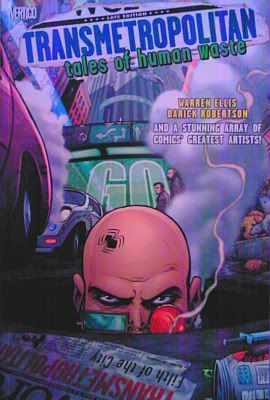
"I hate it here. I hate the way it smells (except when you get into a fully residential quarter where people are predominantly first-gen American: the way people express their culture in their cooking is one of the few good reasons for being alie). I hate the way it looks (except for that weird beauty that hits you in the eye eery other second). I hate the way it thinks (except when it buys this newspaper). I hate the things it does to itself (except when it lets me do them). I hate the way it loes me, and I hate the way it makes me feel. I hate it here... but God help me, I can't imagine liing anywhere else."
(Anti-)hero Spider Jerusalem just refers to it as 'the city', which fits this blog way too perfectly! The series seems to have quite a fixation on prostitution as proiding definitive urban background colour, too, which I need to unpack - that 'Sex and the City' post I promised. Of course it's essentially just romanticised misogyny, but the trope (common enough, think Sin City too) hints at a bigger about urban social relations too, I suspect... But first another trope of Transmetropolitan: drugs.
"You know, when I was a kid, we listened to music that made our parents' eyes bleed and took drugs that made us want to dance and fuck and kill things. That is the way things are supposed to be.
It was, therefore, in the spirit of honest investigation that I internalised a heroic dose of Space, the new social drug enjoyed by the young folk of today as part of the youth culture referred to as Supermodernity.
Supermodernity, apparently, is the experience of being between places; that is, not being in a real place at all, but waiting in transit between one place and the other. This is why SM/Space Culture music appears to us to be utterly silent. You hae to be on Space - slowed down, across places, in the one between ticks of the clock - to be able to hear it.
This is what they do for fun, apparently: suck up appalling volumes of a drug that traps you in an airport waiting lounge of the mind and doesn't let you go for approximately two hundred years while someone plays an antique handheld electronic keyboard in your ear."
First, what the fuck, a reference to the Marc Auge Non-Places: ...Anthropology of Supermodernity that is basically A. getting Terribly Upset about driving on the motorway? Unexpected... But also the suggestion that real cutting-edge spatial theorists ought to be hoovering up ketamine and the other space-time distorters (salvia, perhaps?). The eco actor-network theory of Tim Ingold is essentially based on the acidhead realisations of Gregory Bateson: 'oh shit, man, it's like, all connected! We better be nice to the plants and reindeer now...' So what would the results be for embodiment and architecture if working with disassociatives? Of course architecture students are always already doing these drugs by the bucketload, but is anyone out there integrating it with their practice? I want to know...




